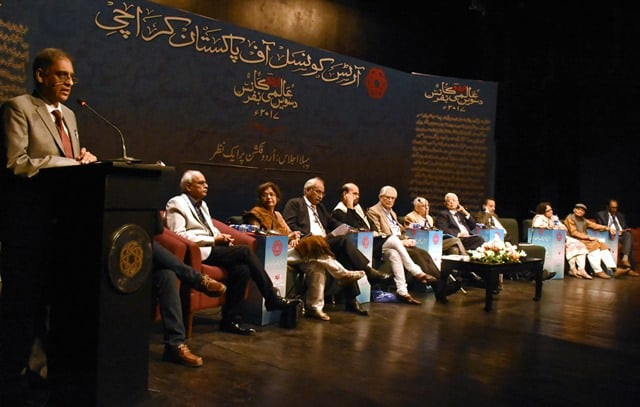‘Society has backtracked from enlightenment to narrow-mindedness’
Literati discuss Urdu fiction in historical context on third day of 13th International Urdu Conference

This society has backtracked from enlightenment to narrow-mindedness, opined noted Urdu columnist, essayist, short story writer, novelist and dramatist Zahida Hina while addressing a session on the third day of the 13th International Urdu Conference on Saturday.
The session, titled 'A Century of Urdu fiction' was presided over by poet Akhtar Saeedi.
Speaking in context of modern Urdu fiction, Hina said writers informed readers about the state of society through literature. "Writers and intellectuals use literature as a weapon. They can never make a place for themselves in among courtiers, but their job is to convey the truth and facts to people."
Saying that Pakistani society had backtracked from enlightenment to narrow-mindedness, she added a glimpse of this transformation was seen in the works of Quratul Ain Haider and other fiction writers.
Poet Saba Ikram spoke about creative styles in contemporary fiction. In this relevance, she explained that 'asloob' was an Arabic word that was being used in Urdu in the sense of style.
"But [writing] style is not adopted [under the influence of] external factors. In fact, it emerges from within creation," commented Ikram. "Whatever a creator feels, it is visible in their style."
Critic and scholar Amjad Tufail discussed Urdu fiction in the context of reality, symbolism and modernity. He lauded persons and bodies who had been promoting literature and culture "amid unfavourable conditions," and pointed out that the Arts Council of Pakistan was on the forefront of this struggle.
He said that the evolution of Urdu fiction spanned 117 years and Pakistan's Independence was a milestone during this transformation.
"Immediately after the creation of Pakistan, we saw an influx of fiction written in the backdrop of [Partition] riots," said Tufail. "Later, [Urdu novelists] brought about a historic change in Urdu fiction, including in it subjects that were considered unsuitable for fiction."
In Tufail's opinion, literary figures of 1980s had similarities in their works, which were a combination of different themes.
According to him, the literati need to adopt new aesthetics to showcase the realities of present times.
"No creator can achieve anything big unless he is connected to his cultural roots and if we want to keep Urdu fiction alive, the [artists] of today will have to stay connected to their roots," he remarked.
Urdu writer, critic, columnist and essayist Nasir Abbas Nayyar, Karachi Press Club's abdi committee secretary Zeb Azkar Hussain and others also spoke on the occasion.
Published in The Express Tribune, December 6th, 2020.



















COMMENTS
Comments are moderated and generally will be posted if they are on-topic and not abusive.
For more information, please see our Comments FAQ